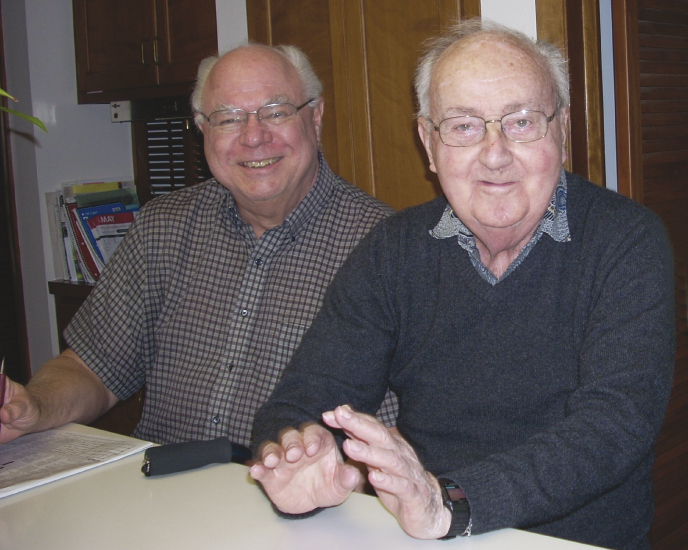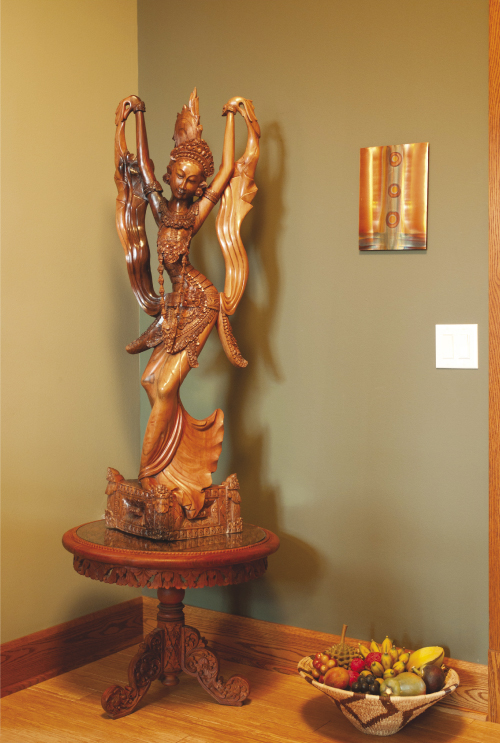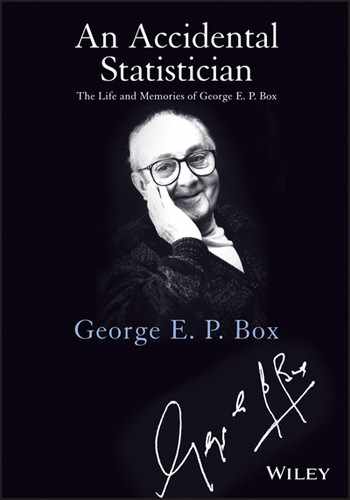“There's nothing like eating hay when you're feeling faint.”
Chapter Fifteen
The Many Sides of Mac
For years, a staunch friend of mine has been Mac Berthouex (or more formally, Professor Paul Mac Berthouex) (Figure 15.1). He taught in the Department of Civil and Environmental Engineering at Wisconsin for 28 years, and he is a world expert on wastewater treatment. His knowledge of how to get a supply of drinkable water to almost any place you care to name has made him internationally famous, and he has spent many years working on projects abroad, usually in poor countries.
Figure 15.1 Mac Berthouex and me.

Clean water is essential to life, but there is only a certain amount of water in the world, and this must be used and reused. Nature has provided a means for this cleansing to be done. It is achieved by aerobic microorganisms that exist in every body of water that is exposed to air. About ten parts per million of oxygen can dissolve in perfectly clean water, and if you check, you'll find that some quantity slightly less than this is to found in streams, rivers, and oceans. Every natural body of water is to some extent slightly polluted. The pollutants provide aerobic organisms with nutrients, which they absorb at the expense of slightly lowering the level of dissolved oxygen. This sets up a tension, and as more oxygen is needed, more is dissolved, so that we have a permanent system for cleaning up the water supply on the planet. The aerobic organisms are quite remarkable; in a matter of a few hours, they can clean up even raw sewage using the activated sludge process1 employed in almost every town throughout the industrial world.
Over the years, Mac and Bill Hunter worked on many projects together. Their friendship dated to Mac's student days at Wisconsin in the 1960s. Mac then spent time working overseas in Germany, returning in 1971 to assume a professorship in the Department of Engineering. He and his wife, Sue, moved into University Houses, and soon after their arrival, there was a knock on the door: It was a grinning Bill bearing bread, salt, and wine—“bread, that this house may never know hunger; salt, that life may always have flavor; and wine, that joy and prosperity may reign forever.”2
Mac and Bill also shared the experience of having lived in Nigeria, although at different times. Mac witnessed the post-colonial disarray in Lagos for several months in 1970, ten years after Nigeria gained its independence from Britain. When he arrived in Lagos, 90% of the city's 800,000 inhabitants used shared taps, wells, and polluted streams for drinking water, and the sanitation infrastructure was virtually nonexistent.3 Mac's study of the problem, which represented the first time he had used multifactorial experiments on a job, doubled the supply of clean drinking water in the city. Part of his work involved a huge settling tank that had been built by the British in 1922. Two crocodiles lived there, and they would sun themselves on the surrounding wall. Later, when Mac taught experimental design to engineering students at Wisconsin, he proposed a factorial experiment in which one variable was whether there were crocs (or no crocs) in a particular settling tank.
I was also fortunate to work with Mac in the late 1980s and 1990s when he had an NSF grant to study, among other things, how to improve control of wastewater treatment plants. We worked on two sets of data and tried to predict the quality of the effluent coming from the plant from a number of input variables measuring the strength of the effluent and a number of process variables.4 These predictions would then serve as an early warning of process upsets that could then hopefully be prevented.
Mac's deep knowledge of water quality issues has taken him to Indonesia many times. He was a consultant to the government on environmental management techniques, a visiting professor on two occasions, and helped to design a new engineering campus. One of his biggest projects concerned industrial pollution control in Java. Claire and I were fortunate to benefit from our friend's acquaintance with this beautiful place when he and Sue invited us to join them on a memorable trip to Bali.
I had been to Indonesia under very different circumstances in 1963. At that time, the University of Wisconsin was interested in directing some of its outreach programs toward Indonesia, which was experiencing political tumult. In 1963, Dean H. Edwin Young asked me to go there, under the auspices of the Ford Foundation, to review a proposal to support a large new university near Bandung. Tensions in Indonesia were high: President Sukarno had increased his ties with Communist China and actively fought the British-sponsored creation of the Federation of Malaysia in September 1963. On September 16, shortly before my arrival, mass demonstrations against the formation of Malaysia had resulted in the burning of the British Embassy and a British Major, Roderick Walker, had defied mob violence by parading up and down in front of the burning embassy, playing his bagpipes in full highland dress.
When I arrived in Jakarta, I was accommodated at the only modern hotel, which the Japanese had built as part of their reparations. At first the huge dining room looked deserted, but from my table in the corner, I became aware that members of the British delegation who had lost their embassy were seated in the far corner across the room.
To facilitate travel, the Ford Foundation allotted me a driver, who, it turned out, had two functions: In addition to driving, he was to carry my handwritten messages, for I was told on no account to use the telephone, which was tapped. I needed to make a number of trips from Jakarta to Bandung. The road was not very wide, and I was surprised one day when my driver guided the car into a ditch. This was to allow the passage of a group of vehicles consisting of two armored cars followed by a Rolls Royce and two more military vehicles, all traveling at great speed on the wrong side of the road. By way of explanation, my driver said, as we got back onto the road, “Presiden!” This was the usual way that Sukarno drove from place to place.
Sukarno liked to be accompanied by beautiful women, and wherever he went there was a phalanx of such ladies lined up beside him. On one occasion, Sukarno was on the other side of the street where my colleague from the Ford Foundation and I were about to cross. Sukarno was heavily guarded by soldiers with a mass of weapons, and it was understood that one was not allowed to cross the street. But my friend did just that, beckoning me to follow. Apparently it was understood that Ford Foundation visitors were immune from attack.
We fell in love with Bali. Mac and Sue found a wonderful place to stay, with simple but comfortable cabanas near the sea. Claire and I would arise at around 6 a.m. each morning, make our way to have coffee at a small restaurant overlooking the sea, and then be off for a walk.
The beach, which was beautiful, had its share of young people selling various items to tourists, always with the assurance that things could be had at a “special price!” Nearby were the shops by the sea. These were canvas structures erected and disassembled each day that sold trinkets and articles of clothing. The ladies who owned the shops soon got to know us, and they were shocked when they realized that Claire and I were prepared to pay the asking price. We got to know Annie, in shop number 10, who was a friend of Mac and Sue's. Annie obligingly offered to teach her how to bargain. And so Claire, who had a Master's degree, got a very different kind of education. Insofar as I could understand it, the critical asking price was about twice the expected selling price, but you needed to proceed by a slow sequence of small adjustments to get there.
Sue, being a teacher of young children, often bought trinkets from Annie to take back as gifts to her students. Customs officials in Milwaukee once suspected Mac and Sue of being covert importers when they saw the packing list detailing what Sue had purchased and shipped to the States. The list contained things like “twenty baskets” and “a dozen dolls,” and Mac had a hard time convincing the officials that these were inexpensive mementos for six-year-olds.
The Balinese are remarkable artists, and wood carving is one of their specialties. Master craftsmen patiently teach small groups, composed of perhaps four to six students each. They can be seen seated outdoors around the master. They work extremely slowly and carefully, often taking several weeks to complete a piece. Claire and I bought a beautiful and intricately carved statue of a dancing girl that stands close to four feet tall (Figure 15.2). The statue was made of dense ebony wood and was extremely heavy. We wondered how we were to get this delicately carved work of art some 10,000 miles back to the United States without damage. It turned out that there was a shop in Bali that specialized in packing and dispatching delicate objects in such a way that they were not broken, and sure enough, this was true for our beautiful dancer who today stands in our hallway.
Figure 15.2 Balinese dancing girl.

The Balinese also specialize in batik painting, which involves the use of wax and dyes, and we are fortunate to have one of these adorning a wall of our home (Figure 15.3).
Figure 15.3 Batik.

Mac has many talents, and these include his ability to write wildly funny plays. On social occasions, he often arrived and, without saying a word, passed out a play that he had written. Each guest was assigned a role, and the play was acted on the spot.
Mac also writes amusing poems in, most famously, The Madison Monitor, a spoof on a local newspaper. One edition of the paper carried the headline, “Berthouex Mistaken for Sociologist,” which was accompanied by the following story:
On Saturday night last, Mac was accosted by a statistician who said, “Who are you? You're a sociologist aren't you?”
Mac admitted that he had wanted to be, but he couldn't pass the practical final examination, which was to get through an open door using only a wood splitting maul and a hand grenade. The door was locked, so he went through the wall. He thought the grade of F was unfair, but the cruelest blow came when the Sociology Examining Committee advised him to go into civil engineering.
He said, “Oh, shit.”
“That line of engineering suits you even better,” they said.
He was considered a promising sociologist as a result of once asserting at a state meeting that, “You shouldn't worry about whether you are rich or poor so long as you have everything you want.”
Dean Bollinger was asked how he felt about his engineering professors being taken for sociologists. He said, “I wish I could get those guys to shave and put on a necktie. That's our biggest problem – that, and the Norwegian chemical engineering professors.”
And in a later edition of the Monitor, an article titled, “It's Not Cricket”:
The English are the only country to have elevated a game to the position of a moral principle. You would never hear an American say, “It's not baseball, old chap.” Or a Japanese say, “It's not sumo wrestling.”
Robin, it is rumored, during dinner one evening, asked an Englishman to explain the game.5
He was encouraged in his task by Robin who seemed genuinely interested as he explained the mysteries of silly mid-on, fine leg, googly, chinaman, and so on. At the end of a half-an-hour he sat back, exhausted but satisfied that he had done his bit toward Anglo-America relations by unraveling the mysteries of cricket for a colonial. Robin looked at him for a long time, shaking her head in wonderment, and then said, “That really is remarkable. And to think they do all that on horseback.”
[Citation: Excerpts from the The Madison Monitor, a parody of a local newspaper written by, and used with permission from, Paul “Mac” Berthouex.]
For a number of years, Mac and I were members of what we called “The Mashed Potato Club.” The club meetings had one item on the agenda: to eat real mashed potatoes. These we found at a local tavern, which, typical for Wisconsin, was family run and had a barroom on one side and a simple restaurant on the other. There was a special each week that featured pot roast, mashed potatoes, and gravy for a pittance. When Mac and I were both in town, we rarely missed this event, and sometimes we permitted other colleagues to indulge alongside us. Unfortunately the tavern closed, but two years ago, we began a new club, “Boys Night Out,” which includes our friends Brian Joiner and Will Zarwell. At 93, I've become a bit less mobile, and so we have yet another permutation, “Boys Night Out In,” which involves getting take-out Thai food and eating it at my house.
1 In older installations, “trickling filters” made use of the same microorganisms.
2 Words that some may recognize from the 1946 Frank Capra film, It's a Wonderful Life, although the tradition of giving bread, salt, and wine as housewarming gifts is much older than the movie.
3 M. Gandy, “Planning, Anti-planning and the Infrastructure Crisis Facing Metropolitan Lagos,” Urban Studies, Vol. 43, No. 2, Feb. 2006, p. 378.This excellent piece may also be accessed on the Internet: http://www.emin.geog.ucl.ac.uk/∼mgandy/urbanstudies.pdf.
4 P.M. Berthouex, G.E.P. Box, and J. Darjatmoko, “Discriminant Upset Analysis,” University of Wisconsin Center for Quality and Productivity Improvement Technical Report No. 30, May 1988. P.M. Berthouex and G.E.P. Box, “Time Series Models for Forecasting Wastewater Treatment Plant Performance,” Water Research, Vol. 30, No. 8, Aug. 1996, pp. 1865–1875.
5 “Robin” is Robin Chapman, a good friend, poet, and scientist who is a regular attendee at gatherings. Being intoxicated by her charms, and therefore not in his right mind, he agreed and embarked on a lengthy and brilliantly lucid explanation.
